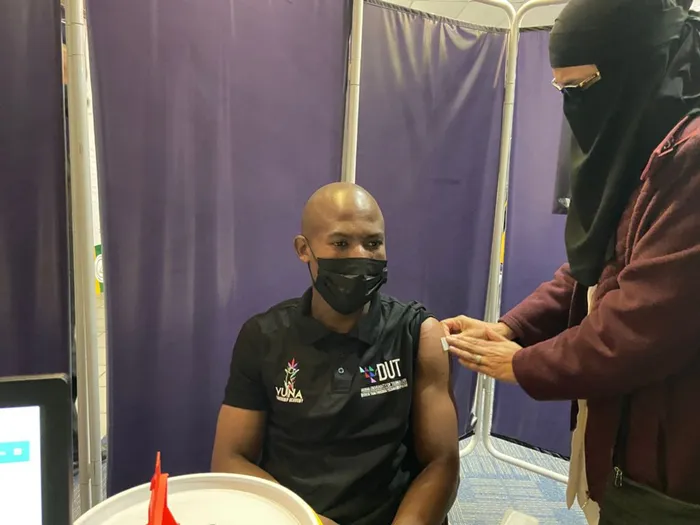SRCs in KZN take the lead to promote Covid-19 vaccination drive on campuses

Student Representative Councils (SRC) have welcomed vaccine sites on campuses and encouraged students to get vaccinated. DUT SRC member, Njabulo Ntshaba getting vaccinated at the vaccine site at Ritson Campus. Picture: Supplied
Students Representative Councils (SRC) in KwaZulu-Natal higher learning institutions have vowed to lead by example and get vaccinated first as institutions have partnered with the Health department to open vaccine sites on campuses.
The University of KwaZulu-Natal (UKZN), along with the Mangosuthu University of Technology (MUT), and the Durban University of Technology (DUT) launched student-friendly Covid-19 vaccine sites that are easily accessible to students and staff members on campus.
Confirming the partnership, KZN Department of Health spokesperson, Ntokozo Maphisa said the government has formed partnerships with various sectors of society, including academic institutions, in promoting mass vaccination.
He said this is to ensure ease of use, for all qualifying population groups, especially with the recent inclusion of the younger cohort aged 18 to 34.
“We are quite pleased with how they have come to the party to work with us in pursuit of our common goal of ultimately achieving herd population immunity.
“They are, indeed, a very potent force multiplier, which is helping us deliver, with one voice, the message that vaccination is important,” said Maphisa.
DUT SRC secretary Njabulo Ntshaba said they have taken it upon themselves as the leadership to be at the forefront of the vaccination drive.
“We are happy that the site is in a familiar environment because it becomes scary for students at a local clinic or sites that are not within the campus,” he said.
Echoing the same sentiment, Mbali Ntshingila of the MUT SRC said students believed in the SRC and they would use that power to encourage students to get vaccinated.
“With us getting involved as student leadership it puts a stamp of approval on this excellent initiative that will see us get back to campus and have our normal lives back. We want to see each other again during classes and have our graduation ceremonies back and this is only possible through vaccination,” she said.
UKZN SRC president, Siyabonga Nkambako said they were excited to be part of the initiative.
“We have been working on encouraging students to vaccinate through our programmes. We have put our entertainment bodies at the forefront of these programmes as this will draw in more students as they want events back,” he said.
Higher Health, which facilitates health and wellness programmes in the post schooling education and training sector (PSET), said they are playing a major part in making vaccination appealing and accessible to the estimated 2.5 million youth who have recently become eligible for the vaccine rollout programme.
Professor Ramneek Ahluwalia, chief executive of Higher Health said: “For now, we are monitoring the progress and logistics of vaccinations for our young students, staff and beneficiaries, across all our universities, TVETs, community colleges, skills centres and private colleges, across our country where we are rolling out vaccinations on campuses or centres established in the close proximity of our institutions.”
Ahluwalia said young people were an important group to target in the mass vaccination roll-out.
“In a young country on a young continent like ours, it is the youth that will determine the trajectory of the pandemic. By opting to be vaccinated in large numbers, our youth can stay healthy, protect others and help reduce the risk of transmission and further mutations that may produce new and possibly more dangerous Covid variants.” he said.
Since the inclusion of the younger population in the national vaccine roll-out programme on August 20, the numbers of people vaccinated increased from 10 431 124 to 14 126 008 people by September 8. To achieve herd immunity, the government is hoping to have at least 40 million people vaccinated against Covid-19 by December 2021.
THE MERCURY
Related Topics: